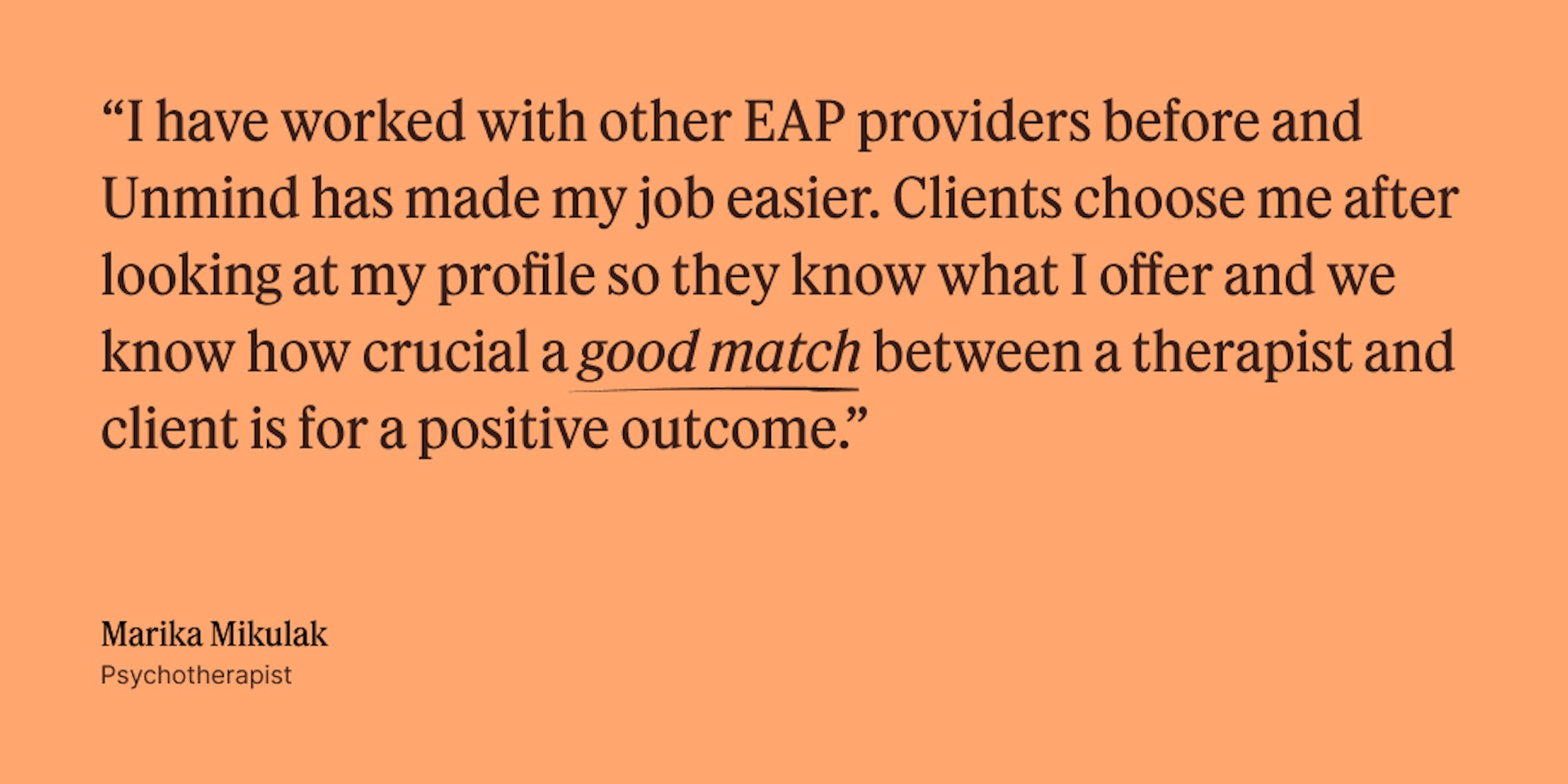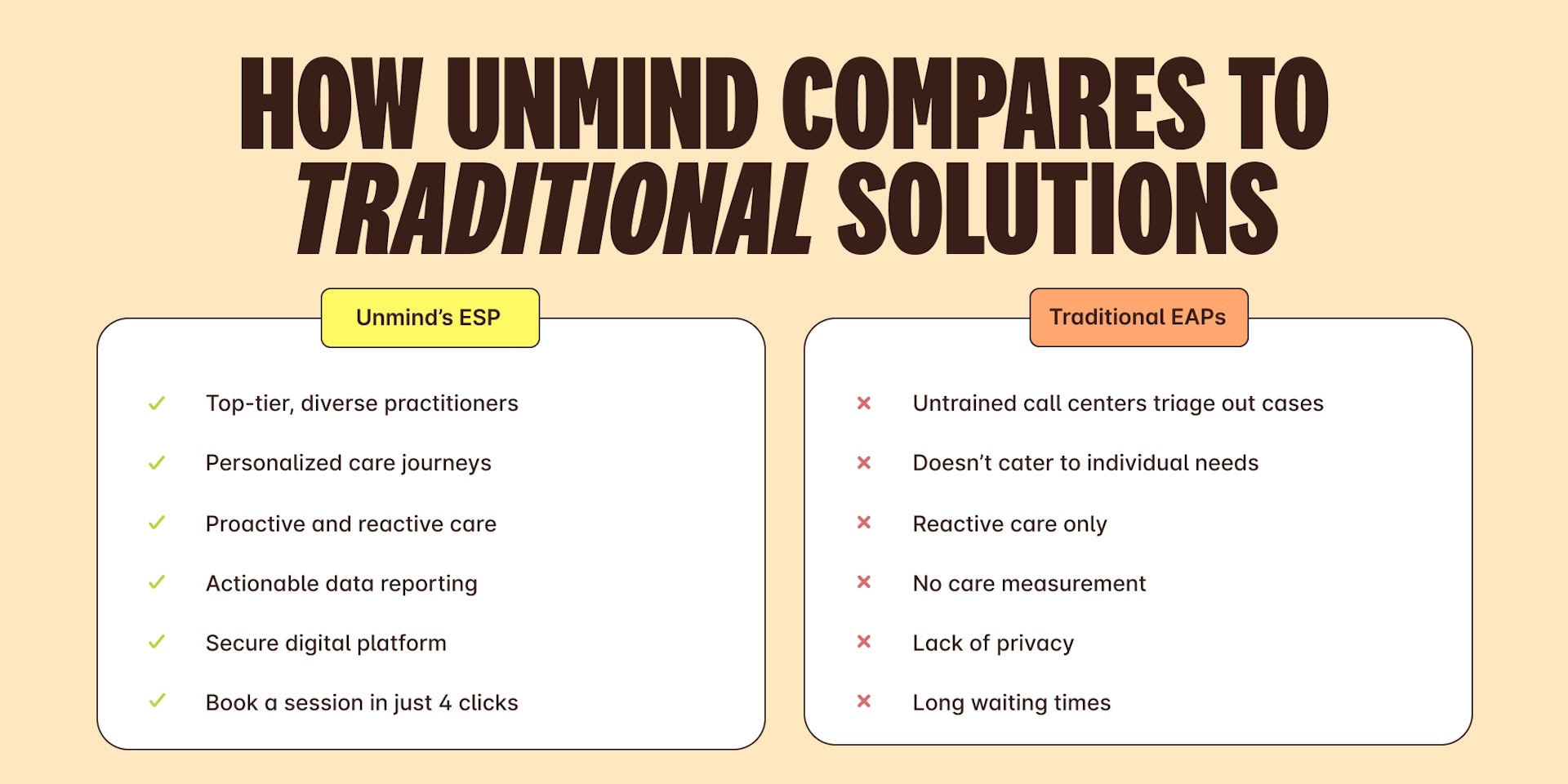Why EAPs are stuck in the past: Finding a sustainable solution

Content
- EAP FAQs: Everything you need to know
- What does EAP stand for?
- What is an EAP?
- How does an EAP work?
- Why are EAPs underused in most companies?
- Why EAPs often fail
- Introducing Unmind’s ESP
Employee assistance programs, also known as EAPs, seek to support organizations by offering employees short-term counseling and other reactive support services. In recent decades, EAPs have become a given in medium to large companies. In fact, it’s estimated that over 96% organizations now have one in place.1
But here’s the elephant in the room: despite positive intentions, EAPs are no longer fit for purpose. With rates of burnout, stress and mental ill health continuing to climb, calls to employee assistance programs (EAPs) are at a record high, with more employees than ever seeking help for complex and often serious wellbeing concerns.2
But that ‘high’ is still only around 12% of the workforce. Many more need support but don’t engage with EAPs. And out of those who do call, it’s estimated only a fifth (less than 3% overall) are offered counseling sessions.3
This is coming at a huge cost to both employees and organizations.
So – how did traditional EAPs become so outdated? Why are they failing to meet the needs of today’s teams? And most importantly, what better options are out there?
Unmind is an employee mental health platform that treats employee wellbeing as a valuable ongoing investment – not just a box to tick. Let’s take a look at some of the most common problems with EAPs and learn why Unmind’s sustainable solution gets the best from your people, every day, year-round.
EAP FAQs: Everything you need to know
Here’s what you need to know about EAPs – including what they are and how they work.
What does EAP stand for?
EAP stands for ‘employee assistance program’. Employee assistance programs were first developed in the 1940s when companies began offering counseling and intervention services to employees struggling with drug and alcohol use. Now, EAPs provide support for a wide range of personal issues and needs.
What is an EAP?
Once an employee assistance program is paid for by an organization, it provides free support services to help employees address issues that may be affecting them at work. EAPs try to provide support across a wide variety of areas, such as:
- Mental health challenges, including stress, anxiety and grief.
- Addictions, including drugs, alcohol or gambling.
- Financial, occupational or legal problems.
- Family, parenting, adopting or caregiving difficulties.
- Abuse and violence.
How does an EAP work?
EAPs are typically provided as part of an organization’s overall health insurance plan. Others are delivered by a third-party service provider or sponsored by management. Usually, employees voluntarily choose to participate in an EAP by referring themselves to services. In rare cases, the human resources department may request or require that an employee participate in a particular service offered.
Why are EAPs underused in most companies?
EAPs that don't deliver often remain in place far beyond their expiration date. On the surface, employee assistance programs seem like an excellent way to offer mental health support in the workplace. So, why are they still not able to support our employees?
Let's take a look at some of the most common reasons why EAPs don't work for modern workplaces.
Why EAPs often fail
The truth is that conventional EAPs often only scratch the surface of offering truly helpful, efficient resources. Here are a few of the reasons they’re falling short:
1. Lack of awareness
Many employees simply don't know their organization offers an EAP. When mental wellbeing support is wrapped up in an overarching insurance plan, it can be unclear what immediate help is available. The lack of awareness also prevents a company culture where mental health is talked about openly.
2. Inefficiency
When a person needs support, they don't want to call a hotline or sift through layers of bureaucracy and paperwork to get help. Even the employees who do make the necessary phone call(s) may be dismissed by the phone center agent if their issue is too complex for an EAP's standard six sessions of therapy.
3. Cookie-cutter care
Most EAPs offer a standardized model of care with nonspecific services. Employees who need counseling are often referred to a therapist at random, regardless of their need for ongoing, specialized help in a particular field of care. This one-size-fits-all approach can alienate workers who would otherwise welcome help. Worst of all, the lack of personalization leaves behind the people who need the most support.
4. Outdated
The overarching framework of an EAP hasn't hugely evolved since it first began in the 1940s. Most services are accessed via a phone call rather than the digital tools most of today's workers are more comfortable with. This old-school approach leads some employees to avoid using their EAP at all.
5. Lack of privacy
Some workers fear that using EAP services will result in stigma or judgment from supervisors. In many cases, they worry that their medical information won't be kept confidential – or even that they will experience negative consequences as a result of participating in an EAP.
6. Limited feedback and learning
Because there's such a wide range of EAP types and delivery methods, there's no clear way to measure how effective they are or gather employee feedback. There's also no intelligent learning, where the program starts to personalize support based on where the employee is on their mental health journey.
7. Care isn’t prioritized
Most recently, urgent questions have been raised about the efficacy of traditional EAPs. Allegations of inadequate responses to severe mental health crises and systemic pressures to minimize referrals to therapy underscore a stark reality: EAPs, originally designed to keep costs at a minimum, don’t genuinely prioritize employee health.
On top of the 'cost-containment' issue, outdated commercial models also struggle to attract and retain top-tier therapists due to insufficient compensation and limited hours per client.

Introducing Unmind’s ESP
Reactive, short-term support only acts as a band-aid – it’s not enough to meet the needs of today’s teams. That’s why, at Unmind, we’ve upgraded the EAP to create the world’s first Employee Sustainability Program (ESP).
Accessible
With Unmind, there are minimal barriers to accessing therapy – no gatekeepers, no waitlists, no justification. Instead of an outdated phone system, employees can book their first session in just four clicks. Our innovative digital tools also fully integrate into your organization’s existing day-to-day systems, providing seamless access to a constant flow of care.
Personalized
We understand that each employee’s mental health journey is unique – and they need care that truly meets them where they are. That’s why we cater to individual employee needs. From on-demand tools and Netflix-level manager training to treatment for a range of mental health issues, our care is completely customized.
Confidential
Employees who are concerned about sharing their private information or having superiors see they’ve sought therapy can enjoy greater peace of mind on Unmind’s confidential, self-serve platform. Our completely confidential care, assessments and other secure mental health tools will give them the privacy they deserve.
Effective
By eliminating the need for physical infrastructure or call center services, we’ve allocated resources to prioritize access to the highest quality therapists. Our competitive pricing model and intuitive platform attract top-tier practitioners, plus our rigorous vetting process ensures we only work with the best.
Diverse
Our network of global practitioners is as diverse as your people, covering 50 spoken languages across every major timezone. We also offer a choice of evidence-based modalities including counseling, CBT, EMDR, DBT and psychodynamic psychotherapy. Not only does this allow employees to find a therapist they click with, it helps build trust and drive impact through cultural understanding.
Measurable
At Unmind, we’re committed to effective measurement and driving continuous impact. That’s why we use globally recognised and validated clinical outcome measures, alongside business outcome questions, to assess the quality and impact of our care. Our full suite of tools gives you access to targeted health and wellbeing data across your organization, plus actionable insights to drive your wellbeing strategy.

Transform your workplace with Unmind’s whole-organization solution
Empower employees with proactive and evidence-based care, harness the power of AI to leverage wellbeing data like never before, and develop accessible wellbeing strategies for significantly greater financial returns.
To find out more about Unmind, book a call.
References:
1. REBA, Employee Wellbeing Research https://reba.global/resource-report/reba-employee-wellbeing-research-2022.html Published 2022.
2. EAPA, Financial Return on EAPs https://www.eapa.org.uk/wp-content/uploads/2023/03/EAPA-ROI-Report-2023.pdf Published 2023.
3. BACP, The Big Issue: Is EAP Counselling Really Working? https://www.bacp.co.uk/bacp-journals/therapy-today/2020/november-2020/the-big-issue/ Published 2020.